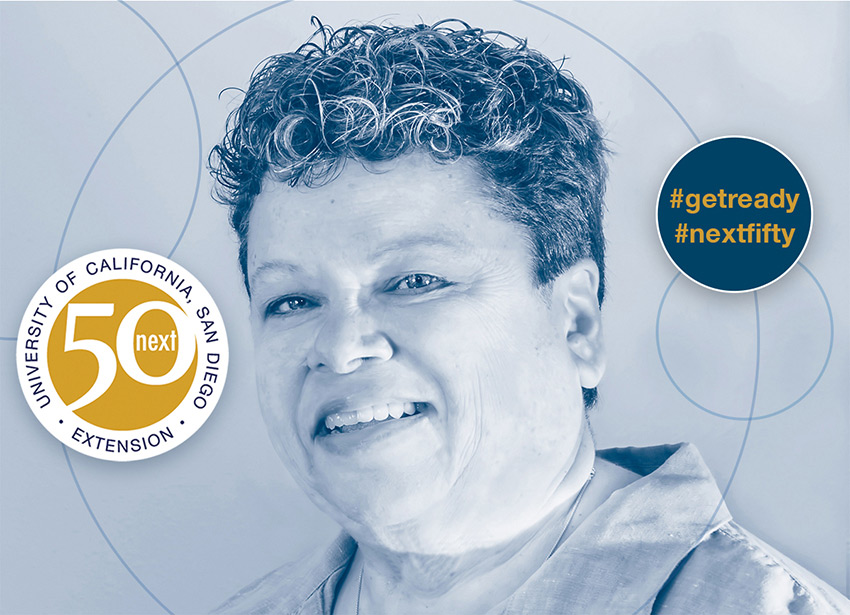
In honor of UC San Diego Extension's first 50 years, 50 Voices of the Future asks thought leaders about the trends, breakthroughs and social advances they foresee over the next 50 years.
Most kids don’t dream of a career as a medical writer. Instead, many fall into medical writing while following an alternate pathway. Some are scientists who prefer writing about medical research rather than conducting it while others start with a passion for writing and realize science is a topic they enjoy writing about. Lori Alexander, president of Editorial Rx, Inc., followed the latter path. “From as early as I can remember, I loved to write, and it didn’t matter what it was about. I then became fascinated with medicine when I started working in a community hospital. I had no idea there was a field out there where I could blend my two loves into one career.” Today, the field is more recognized, but still, medical communication is not a field that is well represented at school career fairs. Programs such as the one at UC San Diego Extension are helping to bring medical communication into the forefront.
Why is the work you do important?
My work—and the work of all medical communicators—is important because clear communication is essential to scientific research and to meaningful patient-physician interactions. My two primary areas of medical writing are continuing medical education for health care professionals and education for people with cancer. Continuing Medical Education is essential for improving the knowledge and skills of health care professionals and thus enhancing health outcomes for patients. The educational resources I develop help people better understand their disease and treatment options, which in turn helps them to make more informed health care decisions. Across medical writing settings, the goals are the same: to create clear medical communications that lead to better health and well being. In fact, this goal is the vision statement for the American Medical Writers Association (AMWA).
What are the influential/exciting developments happening in your field now and why?
So many exciting things are happening right now in medical communication, and they’re related to unprecedented growth in medical research and publishing, changes in the stakeholders in the health care arena, and advances in technology. These developments are helping to create more and varied opportunities for medical communicators. The growth in medical research is reflected in the explosion in the number of clinical trials being conducted, which has increased from 25,858 in 2006 to more than 225,000 this year. Many medical writers are involved with developing the required documentation for the trials and the approvals of new drugs, as well as with writing reports on the trial results and implications. The number of scientific and medical journals is also increasing exponentially—about 2.5 million science, technology, and medicine articles are published each year. Medical writers and editors are needed to help prepare these manuscripts. Increasing discussions about the value and cost of medical products also is leading to new opportunities for medical writers in such areas as health economics and outcomes research, technology assessments and comparative effectiveness research.
Social media is also making its mark as it is changing how medical writers communicate with each other, how researchers communicate with each other, and how research is conveyed to various audiences. These developments not only increase the demand for medical writers but also call for medical writers and editors to enhance their knowledge in science and medicine as well as strengthen their writing skills. The Medical Writing Certificate Program at UC San Diego Extension is an excellent way for scientists to forge a pathway to these exciting opportunities.
What’s the next big thing?
I think the next big thing is certification for medical writers because it provides a way for medical writers to legitimize what they do. American Medical Writers Association developed the first (and only) credentialing program for medical writers, and the examination is based on first-of-its-kind research into the key areas of knowledge, skills and abilities required of medical writers. Certification gives employers a way to feel confident in the credibility of medical writers who have earned this credential. Certification also raises the standard for medical writers and thus increases the need for educational programs to help scientists and others gain the core competencies needed for a career in medical writing.
How big an impact will your field play in shaping the future of the San Diego region and beyond?
The San Diego region is home to hundreds of biotechnology and pharmaceutical companies and California has large health care systems and a strong commitment to medical research. Medical writers and editors can help these industries further advance their goals.
Hop in to your time machine…what does the future look like for this field in 50 years? How can individuals/companies get prepared for what’s next?
Medical communication will ride into the future along with medicine and health care. Physicians predict that technology will dramatically affect how people are treated in the next 50 years and medical communicators will need to keep pace with ways to make data actionable. How do we gather and interpret massive amounts of health data and turn that into information that helps scientists and patients alike? Also, as researchers gain a better understanding of the underlying biology and molecular bases of diseases, the field of personalized medicine will continue to grow. These advances mean that medical communicators will need strong critical thinking and communication skills to translate complex concepts into easily understood content.

Lori Alexander, president of Editorial Rx, Inc., teaches Introduction to Medical Writing at UC San Diego Extension, which is part of the Professional Certificate in Medical Writing.
Photo credit (Lori Alexander's image): Cindy Cone Photography